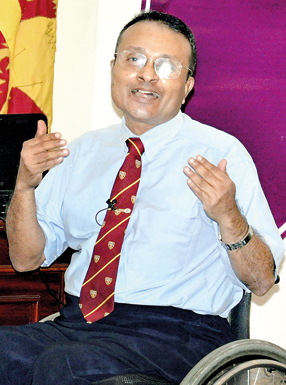Sunday Times 2
Access for all in built environment
Differences, especially concerning varying levels of ability — mobility in particular — are inherent amongst all people.
Every one of us, inevitably, undergoes unnoticed a process of decay and also often meets at some time in life a natural or man-made disaster or numerous debilitating conditions which rob and restrict our ability to attend to day-to-day activities.
None can, therefore, continue with same abilities at all times in life. However, regardless of the degree of ability, social inclusion and integration with dignity, security and safety is an inherent right of all people.

Dr. Ajith Perera: Activist for accessibility
The vicious cycle of marginalisation, isolation and exclusion that still continues with man-designed and built environments that hardly take into consideration this inevitable diversity in human ability, could make everyone at some time in life a wounded horse at the mercy of all.
When this happens it wastes productive potential, restricts gainful opportunities and pushes people towards poverty and unwanted dependency, threatening social, physical, mental and emotional well being and shattering dignity, self confidence, security and safety.
It is also a growing threat to the economic and social development goals of our country! Hence, the current and vital need is embracing and respecting diversity to strengthen social inclusion as integral to economic and social development. A barrel with holes can never be filled with water. Arresting waste of human potential and minimising unwanted dependency are essential pre-requisites for a formidable and sustainable national economy. Access for All is the remedy!
Moving forward
The concept of social integration adopted in this framework of the MNLSI (Ministry of National Languages and Social Integration) was set out at the 1995 Copenhagen Conference on Social Development. Commitment 4 of this declaration emphasises four main essentials that cannot be negotiated or diluted:
- Respect diversity of humanity – here its diversity in ability.
- Equality of opportunity.
- Non-discriminatory treatment.
- Participation of all people with safety and security.
They pave the way enabling built environments to ensure everyone can live and co-exist with all others as productive fully fledged citizens with dignity, security and safety. Already gazetted legislation, unanimous parliament approval of them by all political parties and a Sri Lanka Standard have been accomplished to establish access for all at built environments.
As a measure to arrest discrimination, exclusion and disaster for the people and also the country and furthermore as an initiative to establish these four requirements of the Copenhagen Declaration of 1995, orders have been issued by the Supreme Court of this country in 2011 April and then again in 2013 June.
These orders concerning NEW and RENOVATED public buildings make compliance with design standards, performance specifications and space requirements specified in legislation mandatory; and they state that failure is a serious punishable offence attracting punitive repercussions.
Vision for Sri Lanka
The vision 2010 of His Excellency the President recognises: “Accessibility is particularly important for vulnerable groups for making Sri Lanka a truly dis-Abled friendly country”. His esteemed vision further recognises that: “Built facilities should mobilise and integrate those with restricted ability into society for full participation in all spheres of life as useful and equal partners”.
The orders issued again by the Supreme Court on 17 June 2013 state: “Ensure that those with restricted ability are given every opportunity to integrate freely with the community”. Legislation recognises ‘public building’ as any Government OR Private Sector Building used by the public in daily life. In fact more than 70% of buildings the public uses belong to the private sector. Hence compliance by the private sector too is equally essential and mandatory as it is for the state sector.
Even after long years, it is a national tragedy that, still, there is no effective measures to enforce or implement laws and court orders concerning accessibility.
Hence, violators still go free, victims are made to suffer and incur heavy losses at the mercy of violators!
Fast track action
Sri Lanka can no more aggravate social and economic issues that plague the country in untold proportions resulting from such debacle. The remedial measures of national importance, to become a meaningful reality require the professionals in the building construction industry and the owners/tenants to recognise legal obligations, moral duty and social responsibility to fulfil the four imperative requirements of the Copenhagen Declaration of 1995 and thereby refrain from doing what the apex court and legislation forbid them to do.
We must fast track making MNLSI’s esteemed vision – social inclusion with access for all – a meaningful reality.
In this regard it is imperative to formulate adequate measures to meet the four criteria of the Copenhagen Declaration of 1995 and enforce and implement them effectively when man designs and constructs public facilities and also when he approves plans and issues certificates of conformity in this regard.
Complying with standards to ensure accessibility with safety is a very specialised job. It is NOT one where standards and specifications can be read and just applied, as we often witness now, only to cause waste and added hazards to safety.
It requires guidance and advice backed by specific practical experience and thorough working knowledge on this subject.
Hence, there also must be a system to audit and verify by independent experts what man establishes at built environments complies, not in bits and pieces but in full, with standards, legislations and court orders.

